From the Philippine News Agency (Jul 12, 2024): SC affirms denial of compensation for acquitted ASG member (By Benjamin Pulta)

Supreme Court of the Philippines (PNA file photo)
MANILA – The Supreme Court (SC) on Friday affirmed that persons claiming compensation from the government for unjust imprisonment must have “served time after conviction” after being erroneously charged.
In its 13-page decision published online on July 12, the SC ruled that to be entitled to compensation under Section 3(a) of Republic Act No. (RA) 7309 (Board of Claims for Unjust Imprisonment or Detention and Victims of Violent Crimes), an individual must have been unjustly imprisoned due to a conviction.
The high tribunal’s ruling affirmed the Department of Justice (DOJ) Board of Claims’ denial of the compensation claim filed by Main T. Mohammad, a member of the Abu Sayyaf Group (ASG) who was arrested in 2017 and charged with two counts of murder.
The Board of Claims grants compensation to individuals “unjustly accused, convicted, and imprisoned but subsequently released by virtue of a judgment of acquittal.”
The charges were dismissed in 2019 after the prosecution failed to produce a witness who could identify Mohammad.
Mohammad then filed a compensation claim before the Board of Claims in Zamboanga City.
However, the Board, denied his claim on the ground that prior conviction in the trial court, and subsequent release from detention due to acquittal on appeal, are required.
The Justice Secretary affirmed the Board’s decision, prompting Mohammad to file before the Supreme Court.
The Court explained that to be granted compensation under Section 3(a) of RA 7309, an individual must have been unjustly accused; convicted of the offense; imprisoned due to his conviction; and subsequently acquitted by a judgment.
It noted that in Mohammed’s case “no reason was given to show there was unjust accusation other than the fact that Mohammad was detained for two years, only to be acquitted.”
“Without bad faith on the part of the prosecution, an accusation based on probable guilt that later leads to an acquittal may be considered erroneous, but not necessarily unjust,” the Court said.
https://www.pna.gov.ph/articles/1228885

No comments:
Post a Comment
Note: Only a member of this blog may post a comment.